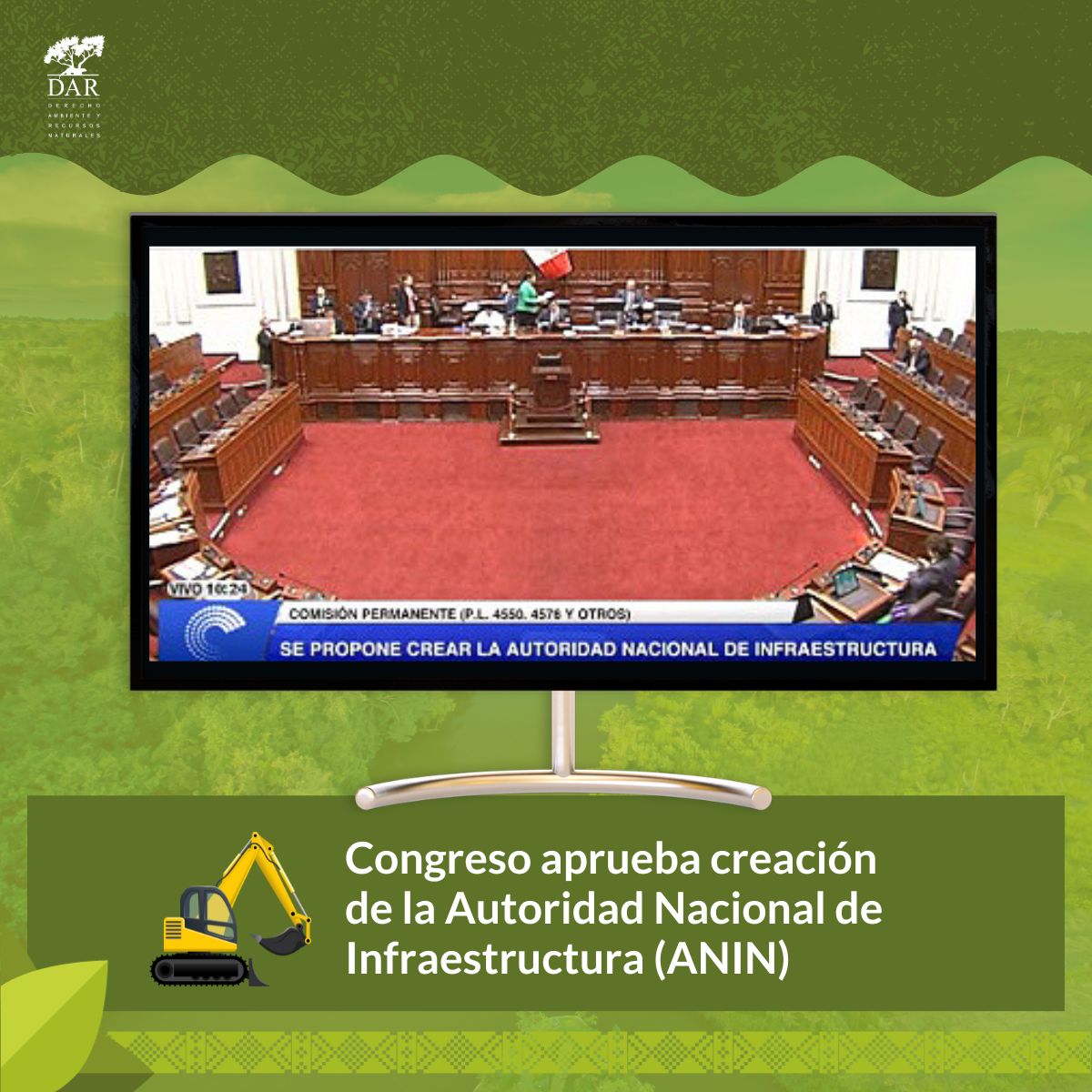- Approved standard relaxes environmental standards without considering the impact of climate change.
Lima, July 6, 2023. In a second vote, the Permanent Commission of the Congress of the Republic approved with 23 votes in favor, 6 against and 1 abstention the replacement text from opinion which groups Bills Nos. 4550, 4576, 4642, 4678, 4908 and 5291, proposing the creation of the National Infrastructure Authority (ANIN).
As it is recalled, last June 20, PL 4642/2022 Nº for the creation of this new Authority was approved in the Plenary of Congress in the first majority vote; establishing provisions for the formulation, execution and maintenance of infrastructure investment projects. Following this, DAR sent the members of the Standing Committee their
recommendations on this proposal
.
For the approval of the PL in the second vote, the president of the Decentralization Commission of the Congress pointed out that the ANIN’s proposal aims to close the infrastructure gap with strategic vision and multi-sector coordination, adding the following modifications in the substitute text: to include among the functions of the ANIN the coordination with CEPLAN, within the framework of the Strategic Plan for National Development to 2050 (article 5 of the substitute text); the extension of the maximum term for the evaluation of the environmental management instrument from 30 to 90 days (article 10.4 of the substitute text); the accompaniment of the Ministry of Culture (Article 10.5 of the substitute text) and a sixth final complementary provision on the absorption of the Authority for Reconstruction with Changes as part of the ANIN.
Although the text replacing the LP took up the proposal of various institutions and organizations
organizations such as DAR
The risk of duplication of functions with the regional governments, by creating an authority that would execute infrastructure projects that would correspond to it territorially, and the risk of duplication of functions with the regional governments, by creating an authority that would execute infrastructure projects that would correspond to it territorially.
There is also a total absence of a risk management approach to climate change. In this regard, Iris Olivera, Project Leader of the civil association Derecho, Ambiente y Recursos Naturales (DAR), points out: «Large-scale projects (over 200 million soles) under the responsibility of ANIN would be granted greater flexibility, with fewer environmental and climate management criteria. This is contradictory to the urgency and need for mitigation and adaptation to climate change with effective actions for sustainable infrastructure».
Without SENACE approval
In the framework of the creation of ANIN, the current obligation of the National System of Environmental Impact Assessment (SEIA) to have the environmental certification approved by the National Environmental Impact Assessment System (SEIA) is eliminated. approved for projects and/or programs, which could now be initiated only with an environmental management instrument that has been evaluated by SENACE during the period of preparation of the technical file or similar (article 10.4 of the approved standard). This would undermine the environmental sustainability of the project to be carried out.
Automatic authorizations
The introduction of positive administrative silence for authorizations for clearing and water use for projects subject to the SEIA (Article 10.1 of the approved regulation) would contravene the Administrative Procedures Law, which establishes the application of negative silence in cases that could significantly affect the public interest in terms of health, environment and natural resources.
Headless
The figure of the Board of Directors of the ANIN (which was in the initial proposal of the PL) was not included, without establishing a special mechanism for coordination with the regional governments, the SEIA and the Ministry of the Environment (MINAM), as the governing body of the SEIA; a concern expressed by this entity and the Ombudsman’s Office in their opinion reports on the Bill.
Therefore, it is necessary to include in the development of the regulation of the approved standard a regulatory analysis of the coherence and consistency of the regulatory framework for environmental and climate management. Likewise, said Regulation should go through a prior consultation process, in compliance with the Prior Consultation Law and the Supreme Court of Justice Ruling No. 29126-2018 LIMA, which establishes the mandatory nature of developing prior, free and informed consultation processes in public services, such as road construction.


